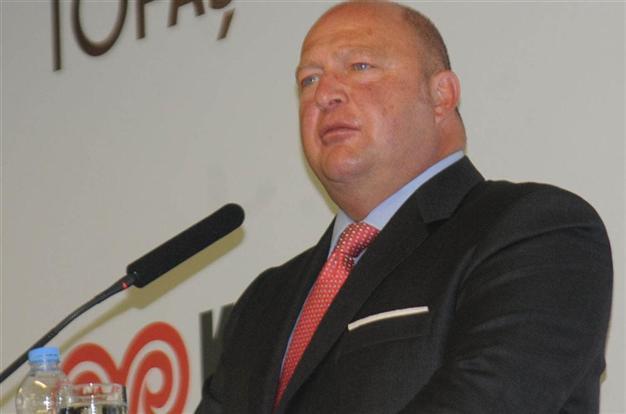Fed decisions, not Gezi protests hit Turkish economy, says Koç Chairman
Jale Özgentürk ISTANBUL -Radikal

Chairman of Koç Holding Mustafa Koç speaks at a press conference. DHA photo
The Turkish economy was faring well until things changed in mid-May, but the cause of this change was not the Gezi protests, but rather the decision of the U.S. Federal Reserve (FED) to end the high liquidity injection in global markets, according to Chairman of Koç Holding Mustafa Koç.Koç Holding, Turkey’s largest business group, was highly criticized by some groups during the summer’s Gezi protests, after its Divan Hotel had opened its doors to protesters fleeing police during clashes.
“There have been many claims that we, as Koç Holding’s owners, are part of a big conspiracy to destroy Turkey. We always talk about how important domestic peace, economic and social stability is for our country’s future and prosperity, as well as for the future of the business world. Therefore, we cannot let comments associating our group with such movements that target Turkey’s stability to stand uncorrected,” Koç said.
He stressed that the most fearful thing at the moment was the spread of tendencies to polarize groups within society.
Koç also responded to criticism that his business had supported the Gezi protesters. “Koç Group unknowingly found itself in the middle of the events. Although we just did what humanity requires, some groups distorted our moves. I saw 70-year-old women as well as 18-year-old boys and girls in Taksim during the protests. Did these people harm our country?” he said.
“I believe that maintaining a discreet stance on the topic was necessary. There were so many people talking. There are many good sides of social media. It is very transparent and you can access to information in an instant. At the same time, however, an event can easily be distorted. I even read fake news claiming that we were closing down factories, which was quoting me as the source,” Koç said.
Claims against Koç companies have become very common
After the Gezi protests, the group’s flagship company, TÜPRAŞ, faced a number of tax and quality controls. And a government committee cancelled the contract for the national warship project (MİLGEM), which had been awarded to Koç Holding’s RMK Marine for around $2.5 billion in January. Finally, some statements read that the Kalamış Marina tender would be renewed, taking away Koç’s right of operation there.
Koç Holding CEO Turgay Durak said energy watchdog checks were carried out on regular basis. “The teams that will be carrying out tax checks have only recently been established, so the tax checks have not started yet on TÜPRAŞ,” Durak said.
Mustafa Koç also responded to these claims for the first time. Regarding the claims surrounding the MİLGEM Project, he said the cancellation was about an objection to a shipyard, which was going to be part of the project, but not about Gezi or any related issue.
“Any change [in our investments] or cancellation [in our contracts], to date, is the subject of mere speculation. We want nothing to do with this,” Koç said, adding that they would be bidding for the Kalamış Marina tender.
‘Central Bank’s year-end lira target of 1.92 very assertive’
“We need to wait and see what the solid results of the FED’s highly expected decision to end the high liquidity party in the markets will be, but it is not a good thing, psychologically, for Turkey to see the lira at 2.00 to the U.S. dollar. It is very difficult to return the lira back to its original position again,” he said.
“The Central Bank announced its year-end target for the lira at a very assertive 1.92. The FED’s decision most likely will affect our economy deeply, as we all were witness to the vulnerability in the money markets around mid-May. Given the situation at hand, it is vital Turkey maintains stability across the board. There must be no pressure on the Central Bank,” Koç added.
















